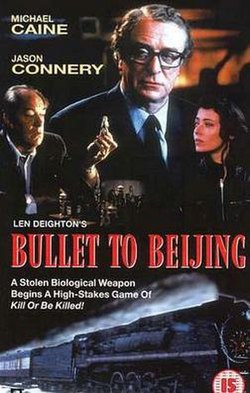Plot
Harry Palmer is forced into early retirement from MI5. He receives a telephone call offering a mysterious job opportunity. Later he is given an air ticket to Saint Petersburg and on arrival is met by a young man named Nikolai. They are followed and shot at by Chechens, before Nick (as Harry insists on calling him) and Natasha can deliver Harry to his potential employer, Alex. Alex tells Harry that a deadly binary biological weapon called Alorex has been stolen; he wants Harry to find it. Harry cannot turn down the pay: $250,000.
Louis, one of his old contacts, tells him that the Alorex will be on a train, the Bullet to Beijing. Ex-KGB Colonel Gradsky and his men are also passengers, as are Nick, Natasha and Craig Warner, yet another unemployed spy, this time formerly with the CIA. When Harry and Nick try to find out what is in the crate Gradsky is transporting to the North Korean embassy, Gradsky (as a professional courtesy) merely has them thrown off the train. Conveniently, though they are in Siberia, there is an airport nearby and they are able to board a crowded, ramshackle Aeroflot aircraft. Though the plane runs out of fuel and has to set down 300 miles from the train's next stop, Harry and Nick just barely manage to get back aboard the Bullet.
When they go to confront Gradsky, they receive several surprises. Natasha, whom they find in the colonel's compartment, turns out to be Gradsky's daughter. Then they learn that Gradsky also works for Alex. Finally, Harry guesses that Alex is selling the Alorex to the North Koreans for heroin, a specialty of Craig's. Nick, who sincerely thinks that Alex is the man to lead Russia in the troubled times ahead, refuses to believe it. Harry talks Gradsky into dumping his half of the Alorex and replacing it with vodka and urine. Then, Harry remembers that Louis' grandson had given him a seemingly innocent gift, a Matryoshka doll. Inside, he finds a vial which is the second deadly component.
Nevertheless, they have to pretend to deliver the Alorex. At the North Korean embassy, Palmer meets another old spy acquaintance, Kim Soo, who has orders to get rid of Harry because he knows too much. Nick rescues him by telephoning to say that Alex will deal with him later. Afterwards, when Harry asks him why he did it, Nick tells him that he thinks Harry is his father. During the Cold War, the Soviets had attempted to suborn a British spy by having a woman agent seduce him. Harry denies being that man, but Nick does not believe him.
On the way back to Saint Petersburg, Harry explains to Nick that Alex planted the specifications for Alorex in his passport, but Harry was not fooled. He burns the valuable but deadly information and tips off both a rival gangster and the police about the incoming heroin shipment. Complications arise when there is an attempt on Harry's life by men working for Kim Soo, which Craig foils. The American, it turns out, is working for the U.S. Drug Enforcement Administration. Harry and his friends emerge relatively unscathed from the chaotic final shootout.
This page is based on this
Wikipedia article Text is available under the
CC BY-SA 4.0 license; additional terms may apply.
Images, videos and audio are available under their respective licenses.
